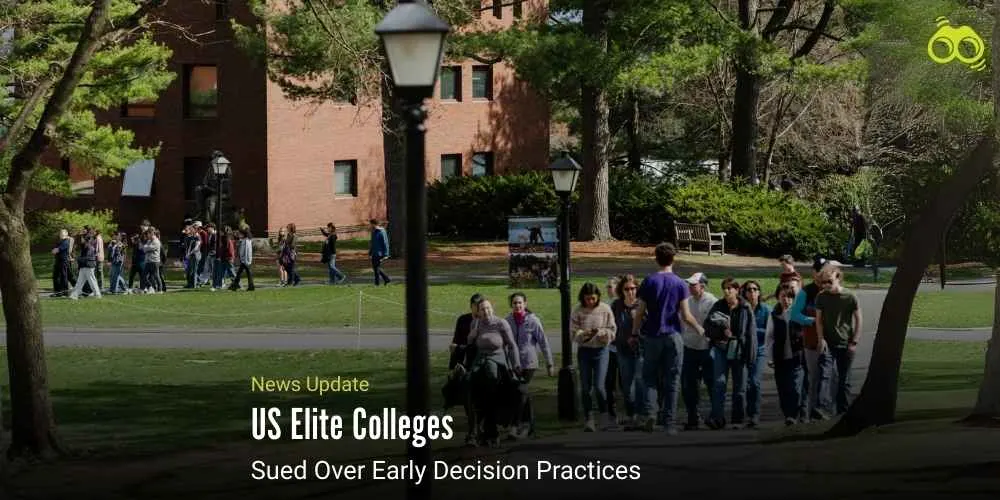Binding Commitments, Broken Trust: Legal Challenge Targets US College Admissions System
32 Prestigious Institutions Accused of Undermining Student Choice Through Admissions Tactics
A landmark lawsuit is challenging the principle of equitable access to higher education in the United States, alleging that several of the country’s most prestigious universities conspired to inflate tuition fees and restrict student choice. Filed in Boston federal court, the proposed class-action suit names 32 elite institutions, including Columbia University, Duke University, and the University of Pennsylvania, for allegedly manipulating early decision admissions to suppress competition and limit applicants’ ability to negotiate financial aid.
According to the complaint, these universities leveraged binding early decision offers to secure student commitments prematurely, thereby reducing market pressure and enabling them to maintain artificially high tuition rates. If successful, the case could have significant implications for admissions practices and affordability across the US higher education sector. Court filings explained that early decision admissions require candidates to apply ahead of regular deadlines and commit to attending if accepted, irrespective of other offers or financial aid considerations. Although such applicants are admitted at higher rates, critics argue that the process disproportionately benefits wealthier families who can commit without comparing financial packages.
The lawsuit further alleged that the institutions agreed not to recruit or offer improved financial aid to one another’s early decision admits. This arrangement, the plaintiffs claimed, allowed universities to control pricing, raise tuition, and disadvantage both early and regular decision applicants. Filed by former students of Wesleyan University and two other institutions, the case asserted that these practices violated US antitrust law. It stated that early decision applicants were denied choice and bargaining power, while regular decision candidates faced reduced availability and lower acceptance rates. Moreover, the suit accused universities of misleading students by portraying early decision commitments as legally binding, despite no legal requirement to honour them.
Among the defendants were Columbia University, Duke University, the University of Pennsylvania, as well as Amherst College, Northwestern University, Vassar College, Wesleyan University, the University of Chicago, and Johns Hopkins University. The Consortium on Financing Higher Education (COFHE) was also named and accused of facilitating the alleged conduct through policy coordination and data sharing.
While Columbia and Penn declined to comment, Duke, Vassar, Wesleyan, and other institutions offered no immediate response. COFHE likewise remained silent. Legal experts noted that universities typically avoid public statements during early litigation stages to safeguard their legal position. The plaintiffs are seeking damages for tuition overcharges affecting early decision applicants since 2021, as well as certain regular decision students. They are also calling for a ban on binding early decision arrangements, a move that could significantly reshape admissions practices at elite institutions.
Analysts observed that a ruling in favour of the plaintiffs could dismantle a long-standing admissions mechanism and address persistent concerns over socioeconomic inequities. The case arrives amid heightened scrutiny of US college admissions, particularly following the Supreme Court’s 2023 decision to end race-conscious admissions. Although universities defend early decision as a tool for managing class size and campus planning, critics maintain that it locks students into commitments before they can assess financial aid options. With substantial tuition revenue and the future of competitive admissions at stake, the outcome of this case could redefine transparency and fairness in American higher education. Its resolution may well mark a turning point in how elite institutions balance selectivity with socioeconomic inclusion.
Editor’s Note:
This lawsuit highlights a long-standing problem in American higher education: the gap between a university’s prestige and true accessibility. For years, elite universities have promoted diversity and inclusion while keeping admissions practices that benefit wealthy and well-informed applicants. Early decision has become a powerful tool for these institutions. It locks students into commitments before they can review financial aid offers, shutting out those who cannot take that risk. If the claims of collusion are true, they reveal not only anti-competitive behaviour but also a deep disregard for fairness in admissions. What is most concerning is the possible coordination among universities that publicly promote fairness while privately maintaining exclusivity. The silence from the defendants and COFHE suggests they are more focused on protecting their image than being accountable.
As per Skoobuzz, abolishing binding early decisions could enhance transparency and student focus in admissions. However, universities must confront the reality that their pursuit of selectivity might have compromised the very ideals they purport to uphold.














0 Comments (Please Login To Continue)